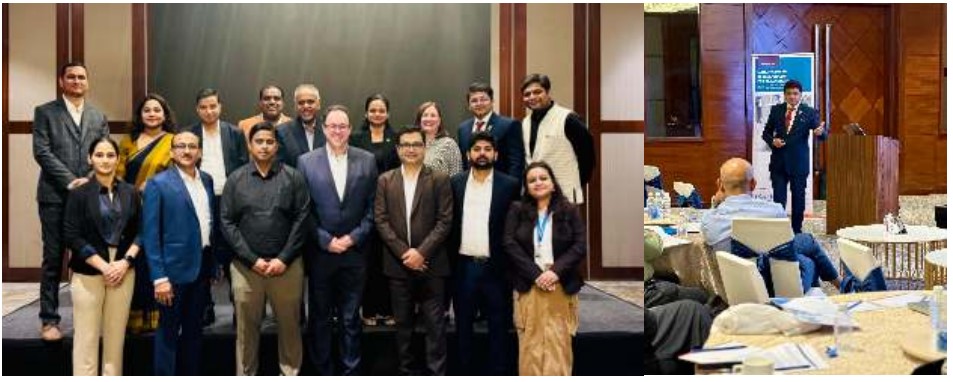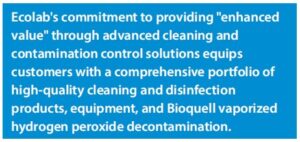Celebrating third consecutive success with ‘2 Cities, 2 Seminars 2025’
Ecolab Life Sciences successfully wrapped up its flagship seminar series, ‘2 Cities, 2 Seminars 2025’, in Ahmedabad on July 2, 2025, and Hyderabad on July 4, 2025. The events gathered representatives from more than 40 companies operating in the pharmaceutical, biopharma, and sterile manufacturing sectors.
In the current dynamic pharmaceutical landscape, effective contamination control goes beyond mere compliance; it is fundamental to product quality, patient safety, and operational resilience. With growing regulatory scrutiny and evolving global challenges, mastering these critical areas is vital for industry professionals.
The seminar addressed the essential challenges surrounding contamination control and regulatory compliance, serving as a platform for knowledge exchange, technical insights, and networking among peers.
Case Study: Contamination Control, Assessment, Cleaning, and Disinfection
This session examined contamination control strategies within the pharmaceutical industry, emphasizing cleaning and disinfection processes. Key principles of the Contamination Control Strategy (CCS) were discussed, including microbial and particle contamination, sterility assurance, and facility design. A case study from a sterile pharmaceutical manufacturer illustrated residue management and material transfer processes, highlighting protective measures and effective disinfection. Current challenges related to CCS reports and regulatory expectations for improvements were also covered, alongside a Q&A session addressing industry professionals’ queries regarding guidance documents from Ecolab CCS experts.
Regulatory Citations/Deficiencies in Cleaning and Disinfection
This presentation focused on regulatory citations and deficiencies noted by agencies such as the FDA and European authorities concerning cleaning and disinfection practices. Key topics included equipment cleaning, disinfectant validation, documentation, contact time, the use of sporicidal agents, and application methods. It critically assessed the shortcomings in recovering microbial contamination to support sound scientific rationale in cleaning protocols. The session particularly addressed emerging trends and concerns from the Asia Pacific region.
Addressing Mould in GMP Environments
This session tackled the pressing issue of mould contamination in GMP environments, emphasizing its threat to product quality and patient safety. Understanding mould’s complexities, including key species of concern, is essential for effective control measures. The presentation covered mould morphology, sources, associated risks, and challenges in pharmaceutical cleanrooms, advocating for robust Corrective and Preventive Actions (CAPAs) to prevent regulatory non-compliance. Case studies on mould contamination incidents provided insights into the challenges and advanced solutions.

Case Study: Transitioning from Traditional Fogging/Fumigation to 35% Hydrogen Peroxide Vapor in Cleanroom Applications
This presentation highlighted the shift from traditional fumigation and fogging methods to 35% Hydrogen Peroxide Vapor (HPV) technology for cleanroom bio-decontamination. It discussed significant regulatory challenges and shortcomings of older methods, such as extended downtime, toxicity, and inconsistent efficacy, and illustrated how HPV offers superior penetration, uniform distribution, and a validated 6-log sporicidal kill. The comparison emphasized regulatory compliance, efficacy, safety, material compatibility, and operational efficiency, positioning HPV as the modern, effective solution. In-depth discussions and a Q&A session deepened understanding of choosing appropriate decontamination procedures and qualification processes based on risk assessment and environmental monitoring requirements.
Regulatory Affairs Update: Navigating the Regulatory Landscape, Supply Security & Trade Dynamics
This presentation underscored the necessity of staying ahead of evolving compliance demands, supply chain risks, and global trade shifts. It provided valuable insights into the regulatory landscape and strategic approaches to ensure continuity, compliance, and confidence in a complex environment.
 Each session was designed to deliver actionable insights on GMP compliance, microbial and residue risk mitigation, cross-contamination, and cleanroom innovation. The agenda featured real-world case studies and regulatory interpretations from global authorities such as the USFDA, EMA, WHO, CDSCO, and PICs.
Each session was designed to deliver actionable insights on GMP compliance, microbial and residue risk mitigation, cross-contamination, and cleanroom innovation. The agenda featured real-world case studies and regulatory interpretations from global authorities such as the USFDA, EMA, WHO, CDSCO, and PICs.
The seminars were led by Ecolab Global Technical Consultants:
- Karan R Khairnar, Sr. Global Technical Consultant Manager, APAC
- Jane Forbes, Sr. Global Technical Consultant Manager, Europe
Ecolab’s commitment to providing “enhanced value” through advanced cleaning and contamination control solutions equips customers with a comprehensive portfolio of high-quality cleaning and disinfection products, equipment, and Bioquell vaporized hydrogen peroxide decontamination. Their focus on “optimized production performance” across critical manufacturing applications enables customers to maximize production uptime and productivity. This global support system aids in contamination control efforts, helping ensure business continuity through tailored solutions and an understanding of region-specific quality and regulatory requirements.
For media inquiries or more information, contact: Ecolab India Communications Team. [email protected]. https://www.ecolab.com

